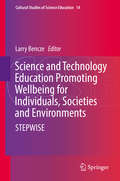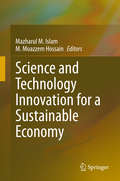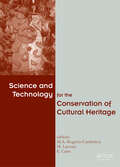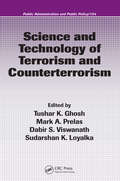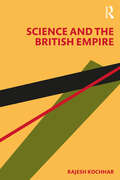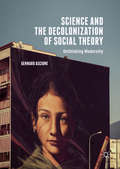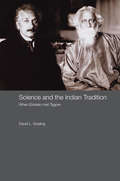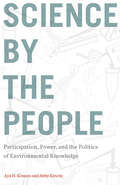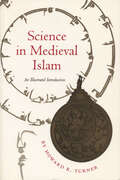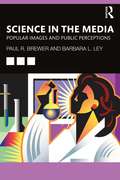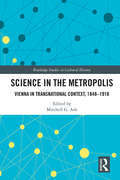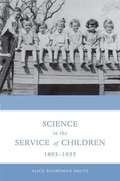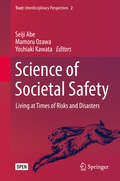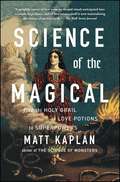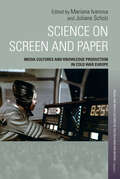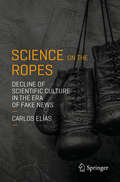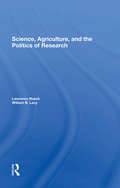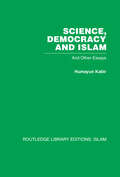- Table View
- List View
Science and Technology Education Promoting Wellbeing for Individuals, Societies and Environments
by Larry BenczeThis edited volume provides theoretical and practical resources relating to the 'STEPWISE' curricular and instructional framework. 'STEPWISE' is the acronym for Science & Technology Education Promoting Wellbeing for Individuals, Societies & Environments. It is a framework for organizing teaching and learning domains in ways that prioritize personal and social actions to address 'critical socioscientific issues' -- that is, controversial decisions by powerful individuals/groups about science and technology (and related fields) that may adversely affect individuals, societies and/or environments. The book contains chapters written by and/or with teachers who have used STEPWISE to guide their instructional practices, as well as chapters written by education scholars who have used a range of theoretical lenses to analyze and evaluate STEPWISE -- and, in several cases, described ways in which it relates to (or could relate to) their practices and/or ways in which the framework might logically be amended. Overall, this book offers educators, policy makers and others with resources useful for arranging science and technology education in ways that may assist societies in addressing significant potential personal, social and/or environmental problems -- such as dramatic climate change, preventable human diseases, species losses, and social injustices -- associated with fields of science and technology.
Science and Technology Innovation for a Sustainable Economy
by Mazharul M. Islam M. Moazzem HossainThis book discusses the subject of pathways to a sustainable economy through science and technology innovations which are regarded as the important components of the ‘4th Industrial Revolution’. The volume has been developed from Bangladesh’s ‘Vision 2041’ agenda which includes development actions needed to catch up with more developed nations. Most importantly, the goals of the ‘Vision 2041’ have been taken from the dreams of the architect of independent Bangladesh, Bangabandhu (Friends of Bengal) Sheikh Mujibur Rahman. His dream was to make Bangladesh the Switzerland of Asia. The Father of Bangladesh Nation was killed by assassins’ bullets along with his most of the family members in August 1975. After his death, the nation moved backwards while recovering from nine months of liberation post war in 1971.Between 1975 and 1990 Bangladesh was ruled by military and quasi military governments. Bangladesh established a true democratic regime in 1996 with Sheikh Mujib’s daughter, Sheikh Hasina, who formed the government after 21 years with a mandate to realise the dreams of her father. Sheikh Hasina, had her own 20 year vision for Bangladesh, called, ‘Vision 2021’, with plans to make the nation poverty free by 2021. After a pause between 2001 and 2008, Sheikh Hasina returned to power in 2009. Under her consecutive three terms she brought Bangladesh back on track and Bangladesh is one of the nations which reduced poverty half under MDGs by 2015. During her third consecutive term Sheikh Hasina, is on the way to transforming Bangladesh into a ‘middle income’ nation by 2021. This volume aims to identify and mitigate the challenges of ‘4th Industrial Revolution’ investigating the areas of science and technology innovations for Bangladesh and for other parts of the world keeping in mind establishing a sustainable economy under UN agendas to 2030 (SDGs). The primary audience for this book are UN development agencies, academic institutions, government policymakers and business leaders of the more developed and developing nations alike.
Science and Technology for the Conservation of Cultural Heritage
by M. Lazzari M.A. Rogerio-Candelera E. CanoFrom 2nd to 5th October 2012 an International Congress on Science and Technology for the conservation of Cultural Heritage was held in Santiago de Compostela, Spain, organized by the Universidade of Santiago de Compostela on behalf of TechnoHeritage Network. The congress was attended by some 160 participants from 10 countries, which presented a tot
Science and Technology of Terrorism and Counterterrorism (Public Administration and Public Policy)
by Thomas M. HaladynaTraditionally, resources on terrorism and counterterrorism tend to focus on the social, behavioral, and legal aspects of the subject, with minimal emphasis on the scientific and technological aspects. Taking into account these practical considerations, the second edition of Science and Technology of Terrorism and Counterterrorism discusses the natu
Science and the British Empire
by Rajesh KochharThis book studies the linkages between science, technology and institution building in Colonial and Modern India. It discusses the advent and growth of modern science in India in terms of a nested three-stage model comprising the colonial-tool stage, the peripheral-native stage and the Indian response stage, each leading to and coexisting with the next. The book gives an account of developments in various fields of science and education in the latter half of the 19th century and the beginning of contributions made by Indian individuals, continuing into the 20th century. It traces the process of colonization and how it led to studies in astronomy, meteorology, natural history, geography and medicine in India.Rich in archival resources, this book will be indispensable for scholars and researchers of history of education, history of science, colonial education, science and technology studies, South Asian history, Indian history and history in general.
Science and the Decolonization of Social Theory
by Gennaro AscioneThis book addresses the ideological figure of modernity, its presumed historical significance as an era, and its theoretical adequacy as a frame. It shows how science is evoked to prevent the sociological imagination from elaborating non-Eurocentric categories and terminologies that are more adequate for a global age. The idea of modernity should not only be contested, but radically unthought in its foundational assumptions. These assumptions inform concepts such as secularization, emancipation, the 'global' and accumulation of capital. This book frees these concepts from ethnocentrism and discloses a path toward a new, non-Eurocentric, global social theory. Gennaro Ascione explores the transformative potential of decolonizing knowledge through a radical reconsideration of the historical and epistemological role that the intellectual reference to science plays in the construction of concepts. This ground-breaking work challenges social theorists to think globally beyond modernity, bringing together social theory and science in an unprecedented way. Importantly, it makes accessible a new space of missing theorization for further developments and inquiries in the field.
Science and the Indian Tradition: When Einstein Met Tagore (India in the Modern World #Vol. 3)
by David L. GoslingThis new text is a detailed study of an important process in modern Indian history. During the late nineteenth and early twentieth century, India experienced an intellectual renaissance, which owed as much to the influx of new ideas from the West as to traditional religious and cultural insights. Gosling examines the effects of the introduction of Western science into India, and the relationship between Indian traditions of thought and secular Western scientific doctrine. He charts the early development of science in India, its role in the secularization of Indian society, and the subsequent reassertion, adaptation and rejection of traditional modes of thought. The beliefs of key Indian scientists, including Jagadish Chandra Bose, P.C. Roy and S.N. Bose are explored and the book goes on to reflect upon how individual scientists could still accept particular religious beliefs such as reincarnation, cosmology, miracles and prayer. Science and the Indian Tradition gives an in-depth assessment of results of the introduction of Western science into India, and will be of interest to scholars of Indian history and those interested in the interaction between Western and Indian traditions of intellectual thought.
Science by the People: Participation, Power, and the Politics of Environmental Knowledge (Nature, Society, and Culture)
by Aya H. Kimura Abby KinchyCitizen science—research involving nonprofessionals in the research process—has attracted both strong enthusiasts and detractors. Many environmental professionals, activists, and scholars consider citizen science part of their toolkit for addressing environmental challenges. Critics, however, contend that it represents a corporate takeover of scientific priorities. In this timely book, two sociologists move beyond this binary debate by analyzing the tensions and dilemmas that citizen science projects commonly face. Key lessons are drawn from case studies where citizen scientists have investigated the impact of shale oil and gas, nuclear power, and genetically engineered crops. These studies show that diverse citizen science projects face shared dilemmas relating to austerity pressures, presumed boundaries between science and activism, and difficulties moving between scales of environmental problems. By unpacking the politics of citizen science, this book aims to help people negotiate a complex political landscape and choose paths moving toward social change and environmental sustainability.
Science in History: Death in Beijing
by Daniel AsenIn this innovative and engaging history of homicide investigation in Republican Beijing, Daniel Asen explores the transformation of ideas about death in China in the first half of the twentieth century. In this period, those who died violently or under suspicious circumstances constituted a particularly important population of the dead, subject to new claims by police, legal and medical professionals, and a newspaper industry intent on covering urban fatality in sensational detail. Asen examines the process through which imperial China's old tradition of forensic science came to serve the needs of a changing state and society under these dramatically new circumstances. This is a story of the unexpected outcomes and contingencies of modernity, presenting new perspectives on China's transition from empire to modern nation state, competing visions of science and expertise, and the ways in which the meanings of death and dead bodies changed amid China's modern transformation.
Science in Medieval Islam: An Illustrated Introduction
by Howard R. TurnerDuring the Golden Age of Islam (seventh through seventeenth centuries A. D. ), Muslim philosophers and poets, artists and scientists, princes and laborers created a unique culture that has influenced societies on every continent. This book offers a fully illustrated, highly accessible introduction to an important aspect of that culture-the scientific achievements of medieval Islam. Howard Turner opens with a historical overview of the spread of Islamic civilization from the Arabian peninsula eastward to India and westward across northern Africa into Spain. He describes how a passion for knowledge led the Muslims during their centuries of empire-building to assimilate and expand the scientific knowledge of older cultures, including those of Greece, India, and China. He explores medieval Islamic accomplishments in cosmology, mathematics, astronomy, astrology, geography, medicine, natural sciences, alchemy, and optics. He also indicates the ways in which Muslim scientific achievement influenced the advance of science in the Western world from the Renaissance to the modern era. This survey of historic Muslim scientific achievements offers students and general readers a window into one of the world's great cultures, one which is experiencing a remarkable resurgence as a religious, political, and social force in our own time.
Science in Victorian Manchester: Enterprise and Expertise
by H. Kargon RobertThe evolution of an urban scientific community under the pressures of conceptual and social change is the main focus of this book. Manchester was Victorian Britain's leading industrial city. In order to describe and analyze the transformation of science in the eighteenth century, Robert Kargon closely examines Manchester through successive stages. In so doing, he traces the evolution of science from an activity pursued by gentlemen-amateurs to a highly specialized profession.At the end of this process, the author shows, a major trans formation in our understanding of the nature of science can be discerned: scientific knowledge, it was realized, could be produced. Science was no longer regarded primarily as the di vine design rendered into laws of nature, but rather as a method, or instrument, to be applied to novel areas of human endeavor. Science had become on the one hand enterprise, and on the other expertise. In each chapter, Kargon relates the changing conception of science and its social role to the birth, growth, and character of the city's scientific institutions.The contours of the scientific community-its interests, concerns, and approaches to what it came to see as critical problem---were shaped by its civic environment. Its character, in turn, responded to the development of the disciplines represented within it. As the sciences increased in specialization and complexity during the course of the nineteenth century, they placed new stress upon the community, affecting the composition of its membership and the nature of its leading institutions. The scientific frontier reacted upon Manchester just as Manchester acted upon it. Now available in paperback, this classic work in history includes a new introduction by the author.
Science in the Media: Popular Images and Public Perceptions
by Paul R Brewer Barbara L LeyThis timely and accessible text shows how portrayals of science in popular media—including television, movies, and social media—influence public attitudes around messages from the scientific community, affect the kinds of research that receive support, and inform perceptions of who can become a scientist. The book builds on theories of cultivation, priming, framing, and media models while drawing on years of content analyses, national surveys, and experiments. A wide variety of media genres—from Hollywood blockbusters and prime-time television shows to cable news channels and satirical comedy programs, science documentaries and children’s cartoons to Facebook posts and YouTube videos—are explored with rigorous social science research and an engaging, accessible style. Case studies on climate change, vaccines, genetically modified foods, evolution, space exploration, and forensic DNA testing are presented alongside reflections on media stereotypes and disparities in terms of gender, race, and other social identities. Science in the Media illuminates how scientists and media producers can bridge gaps between the scientific community and the public, foster engagement with science, and promote an inclusive vision of science, while also highlighting how readers themselves can become more active and critical consumers of media messages about science. Science in the Media serves as a supplemental text for courses in science communication and media studies, and will be of interest to anyone concerned with publicly engaged science.
Science in the Metropolis: Vienna in Transnational Context, 1848–1918 (Routledge Studies in Cultural History #96)
by Mitchell G. AshThis book presents new research on spaces for science and processes of interurban and transnational knowledge transfer and exchange in the imperial metropolis of Vienna in the late nineteenth and early twentieth centuries. Chapters discuss Habsburg science policy, metropolitan natural history museums, large technical projects including the Ringstrasse and water pipelines from the Alps, urban geology, geography, public reports on polar exploration, exchanges of ethnographic objects, popular scientific societies and scientifically oriented adult education. The infrastructures and knowledge spaces described here were preconditions for the explosion of creativity known as 'Vienna 1900.'
Science in the Service of Children, 1893-1935
by Alice Boardman Smuts Robert W. Smuts R. Malcolm Smuts Barbara B. Smuts P. Lindsay Chase-LansdaleThis book is the first comprehensive history of the development of child study during the early part of the twentieth century. Most nineteenth-century scientists deemed children unsuitable subjects for study, and parents were hostile to the idea. But by 1935, the study of the child was a thriving scientific and professional field. Here, Alice Boardman Smuts shows how interrelated movements-social and scientific-combined to transform the study of the child. Drawing on nationwide archives and extensive interviews with child study pioneers, Smuts recounts the role of social reformers, philanthropists, and progressive scientists who established new institutions with new ways of studying children. Part history of science and part social history, this book describes a fascinating era when the normal child was studied for the first time, a child guidance movement emerged, and the newly created federal Children's Bureau conducted pathbreaking sociological studies of children.
Science matters!: Wissenschaftlich statt querdenken
by Tilmann BetschWas ist eigentlich Wissenschaft? Diese Frage wird angesichts globaler Herausforderungen wie COVID-19, dem Klimawandel u.a. zunehmend neu diskutiert – und wir erleben eine beängstigende Zunahme des Widerstandes gegen die wissenschaftlichen Methoden aufseiten sogenannter Querdenker, Verschwörungstheoretiker und Faktenleugner. Doch viele kritisieren die Wissenschaft, ohne den Kern wissenschaftlichen Denkens und Arbeitens verstanden zu haben! Prof. Dr. Tilmann Betsch tritt diesem Trend mit seinem Buch entschlossen entgegen und hält ein leidenschaftliches Plädoyer, warum Wissenschaft unverzichtbar ist: Anhand anschaulicher Beispiele und Anekdoten beschreibt er die Bestandteile des wissenschaftlichen Werkzeugkastens – jedes Kapitel klärt dabei ein gängiges Vorurteil gegenüber der Wissenschaft auf und zeigt, mit welchen Methoden Erkenntnisse in der Forschung wirklich gewonnen werden.Dieses Buch gibt Ihnen Hilfestellung, Ihr kritisches Denken zu schärfen und Unfug schlagfertig entgegenzutreten. Es richtet sich damit nicht nur an Studierende der Wissenschaften, sondern an alle Interessierten, die „alternative Fakten“ nicht mehr hören können und für Diskussionen um die Bedeutung der Wissenschaft gewappnet sein wollen.
Science of Societal Safety: Living At Times Of Risks And Disasters (Trust Ser. #2)
by Seiji Abe Mamoru Ozawa Yoshiaki KawataThis open access book covers comprehensive but fundamental principles and concepts of disaster and accident prevention and mitigation, countermeasures, and recovery from disasters or accidents including treatment and care of the victims. Safety and security problems in our society involve not only engineering but also social, legal, economic, cultural, and psychological issues. The enhancement needed for societal safety includes comprehensive activities of all aspects from precaution to recovery, not only of people but also of governments. In this context, the authors, members of the Faculty of Societal Safety Science, Kansai University, conducted many discussions and concluded that the major strategy is consistent independently of the type and magnitude of disaster or accident, being also the principle of the foundation of our faculty.The topics treated in this book are rather widely distributed but are well organized sequentially to provide a clear understanding of the principles of societal safety. In the first part the fundamental concepts of safety are discussed. The second part deals with risks in the societal and natural environment. Then follows, in the third part, a description of the quantitative estimation of risk and its assessment and management. The fourth part is devoted to disaster prevention, mitigation, and recovery systems. The final, fifth part presents a future perspective of societal safety science.Thorough reading of this introductory volume of societal safety science provides a clear image of the issues. This is largely because the Japanese have suffered often from natural disasters and not only have gained much valuable information about disasters but also have accumulated a store of experience. We are still in the process of reconstruction from the Great East Japan earthquake and the Fukushima nuclear power plant accident. This book is especially valuable therefore in studying the safety and security of people and their societies.
Science of the Magical: From the Holy Grail to Love Potions to Superpowers
by Matt Kaplan“Filled with cool cocktail-party tidbits, Matt Kaplan considers how things that were once the stuff of legends could one day become reality” (The Atlantic) in this fun scientific inquiry into the mystical places and magical objects of ancient and contemporary lore—from the fountain of youth, to love potions, to Super Mario’s mushrooms.Can migrations of birds foretell our future? Do phases of the moon hold sway over our lives? Are there sacred springs that cure the ill? What is the best way to brew a love potion? How do we create mutant humans who regenerate like Wolverine? “In Science of the Magical, Matt Kaplan takes us on a journey spiced with the wonders of myth, history and art, leavened with impeccable research, endlessly fascinating. And the result is both a compelling read and a deeply thoughtful exploration of the world around us and the ways we seek to understand it” (Deborah Blum, author of The Poisoner’s Handbook). Like Ken Jennings and Mary Roach, Kaplan serves as a friendly armchair guide to the world of the supernatural. From the strengthening powers of Viking mead to the super soldiers in movies such as Captain America, Kaplan explores cultures and time periods to point out that there is often much more to these enduring magical narratives than mere fantasy. Informative and entertaining, Science of the Magical is “a sprightly survey” (The Wall Street Journal) and “a joy to read…highly recommended” (Library Journal, starred review).
Science on Screen and Paper: Media Cultures and Knowledge Production in Cold War Europe (Visual and Media Cultures of the Cold War and Beyond #2)
by Mariana Ivanova and Juliane ScholzDuring the Cold War, scientific discoveries were adapted and critiqued in many different forms of media across a divided Europe. Now, more than 30 years since the end of the Cold War, Science on Screen and Paper explores the intersections between scientific research and media by drawing from media history, film studies, and the history of science. From public relations material to educational and science films, from children’s magazines to television broadcasts, the contributions in this collected volume seek to embrace medial differences and focus on intersectional themes and strategies for the representation of science.
Science on the Ropes: Decline of Scientific Culture in the Era of Fake News
by Carlos ElíasIn this controversial essay, Carlos Elías addresses the worldwide phenomenon that is threatening the scientific and economic progress of Western countries. The rise and influence of magic and irrationality in the media, in social networks and at universities is a disturbing phenomenon: many Western students no longer want to pursue STEM (Science, Technologies, Engineering, and Math) careers. This lucid and well-written book addresses one of the key issues of public debate: the deteriorating state of science in Western countries and their governments, and its rise in Asian countries. The author compares two distinct models: the Spanish or Latin model, which closed the door on science with the Counter-Reformation, and that employed by a second group of countries where science was encouraged. Elías suggests that a similar development could now be taking place between Western countries (where the press, television and social science academics are becoming increasingly critical towards science) and Asia, where most prime ministers (and other politicians) are scientists or engineers. This book is intended for STEM educators (both at secondary schools and universities), scientists and academics interested in scientific culture in the era of fake news.
Science, Agriculture, And The Politics Of Research
by Lawrence M Busch William B LacyMany friends, colleagues, and research staff members have directly and indirectly contributed to this book. It is impossible to acknowledge the contribution of each. Still, we would like to recognize several persons as well as institutions that have been particularly helpful. Research funds were provided by the Kentucky Agricultural Experiment Station and by the Ford Foundation. John Myers of the Current Research Information System provided us with a computer tape listing current projects. Carolyn Sachs was extremely helpful in coordinating the mail survey of scientists. Christian Ritter, Lisa Slatin, and Bobbie Sparks assisted in coding the data. Ann Stockham developed the index and also organized the data. Janet Baynham, Sue Lewis, and Greg Taylor aided in the voluminous computer programming and statistical analysis. Rosemary Cheek typed most of the manuscript. Marlene Pettit, Michael Claycomb, Deborah Wheeler, and Penny Hogue also assisted in the typing. Janice Taylor aided in the manuscript typing and ran interference on much of the administrative detail.
Science, Bread, and Circuses
by Gregory SchremppIn Science, Bread, and Circuses, Gregory Schrempp brings a folkloristic viewpoint to the topic of popular science, calling attention to the persistence of folkloric form, idiom, and worldview within the increasingly important dimension of popular consciousness defined by the impact of science.Schrempp considers specific examples of texts in which science interpreters employ folkloric tropes-myths, legends, epics, proverbs, spectacles, and a variety of gestures from religious tradition-to lend credibility and appeal to their messages. In each essay he explores an instance of science popularization rooted in the quotidian round: variations of proverb formulas in monumental measurements, invocations of science heroes like saints or other inspirational figures, the battle of mythos and logos in parenting and academe, how the meme has become embroiled in quasi-religious treatments of the problem of evil, and a range of other tropes of folklore drafted to serve the exposition of science.Science, Bread, and Circuses places the relationship of science and folklore at the very center of folkloristic inquiry by exploring a range of attempts to rephrase and thus domesticate scientific findings and claims in folklorically imbued popular forms.
Science, Bread, and Circuses: Folkloristic Essays on Science for the Masses (G - Reference, Information And Interdisciplinary Subjects Ser.)
by Gregory SchremppIn Science, Bread, and Circuses, Gregory Schrempp brings a folkloristic viewpoint to the topic of popular science, calling attention to the persistence of folkloric form, idiom, and worldview within the increasingly important dimension of popular consciousness defined by the impact of science. Schrempp considers specific examples of texts in which science interpreters employ folkloric tropes—myths, legends, epics, proverbs, spectacles, and a variety of gestures from religious traditions—to lend credibility and appeal to their messages. In each essay he explores an instance of science popularization rooted in the quotidian round: variations of proverb formulas in monumental measurements, invocations of science heroes like saints or other inspirational figures, the battle of mythos and logos in parenting and academe, the meme's involvement in quasi-religious treatments of the problem of evil, and a range of other tropes of folklore drafted to serve the exposition of science. Science, Bread, and Circuses places the relationship of science and folklore at the very center of folkloristic inquiry by exploring a range of attempts to rephrase and thus domesticate scientific findings and claims in folklorically imbued popular forms.
Science, Colonialism, and Indigenous Peoples: The Cultural Politics of Law and Knowledge
by Laurelyn WhittAt the intersection of indigenous studies, science studies, and legal studies lies a tense web of political issues of vital concern for the survival of indigenous nations. Numerous historians of science have documented the vital role of late-eighteenth- and nineteenth-century science as a part of statecraft, a means of extending empire. This book follows imperialism into the present, demonstrating how pursuit of knowledge of the natural world impacts, and is impacted by, indigenous peoples rather than nation-states. In extractive biocolonialism, the valued genetic resources, and associated agricultural and medicinal knowledge, of indigenous peoples are sought, legally converted into private intellectual property, transformed into commodities, and then placed for sale in genetic marketplaces. Science, Colonialism, and Indigenous Peoples critically examines these developments, demonstrating how contemporary relations between indigenous and Western knowledge systems continue to be shaped by the dynamics of power, the politics of property, and the apologetics of law.
Science, Culture and National Identity in Francoist Spain, 1939–1959
by Marició Janué i Miret Albert Presas i PuigThis book examines the role that science and culture held as instruments of nationalization policies during the first phase of the Franco regime in Spain. It considers the reciprocal relationship between political legitimacy and developments in science and culture, and explores the ‘nationalization’ efforts in Spain in the 1940s and 1950s, via the complex process of transmitting narratives of national identity, through ideas, representations and homogenizing practices. Taking an interdisciplinary approach, the volume features insights into how scientific and cultural language and symbols were used to formulate national identity, through institutions, resource distribution and specific national policies. Split into five parts, the collection considers policies in the Francoist ‘New State’, the role of women in these debates, and perspectives on the nationalization and internationalization efforts that made use of scientific and cultural spheres. Chapters also feature insights into cinema, literature, cultural diplomacy, mathematics and technology in debates on Catalonia, the Nuclear Energy Board, the Spanish National Research Council, and how scientific tools in Spain in this era fed into wider geopolitics with America and onto the UNESCO stage.
Science, Democracy and Islam: And other essays
by Humayun KabirFirst published in 2008. Routledge is an imprint of Taylor & Francis, an informa company.
